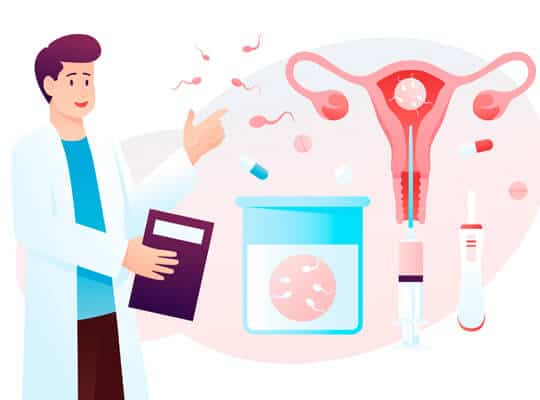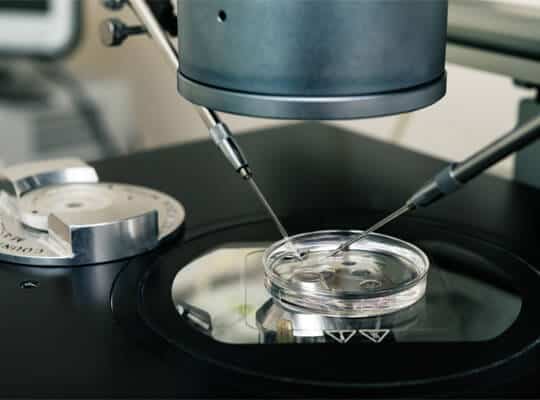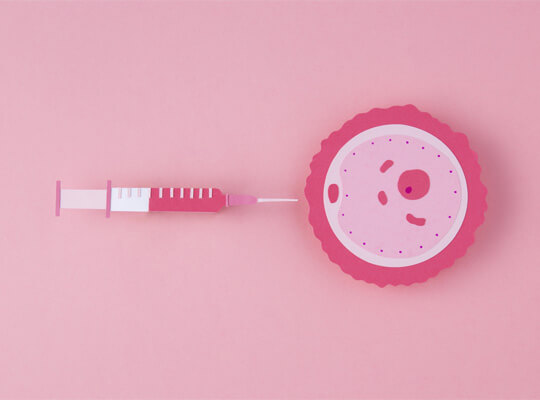Intrauterine Insemination (IUI)
Table of Contents
The success rate of IUI procedures in the Turkish Republic of Northern Cyprus is over 90%. Trying this method as the first step before starting IVF treatment gives positive results to many couples.
What is Intrauterine insemination (IUI)?
Intrauterine insemination (IUI) is a treatment method in which sperm that has been previously washed with medical procedures is introduced into the uterus through a catheter to promote fertilization. Intrauterine insemination (IUI) may be suitable for couples who have been trying to conceive naturally for an average of 1 year, but who cannot conceive. Depending on the causes of infertility, IUI may be coordinated with your normal cycle or with fertility drugs.
It is frequently used as a treatment option for people with poor sperm quality, people with erectile dysfunction, having antibodies that damage sperm cells in women, people with endometriosis, and people with unexplained infertility problems. For the ideal application of this method, the sperm quality should be at a certain level and there should be no obstruction in the fallopian tubes in the woman.
How does Intrauterine insemination IUI work?
The couple who cannot have a baby naturally, apply to the doctor together, and in this case, both men and women go through a detailed examination process.
If it is decided to perform intrauterine insemination as a result of all controls, examinations and evaluations, the semen taken from the father-to-be is analyzed and the sperms in it are washed. The most suitable sperms selected for fertilization are placed in the uterus and fertilization is ensured here. Intrauterine insemination processes can be accompanied by drug therapy or by natural means. In medicated intrauterine insemination (IUI), by using ovulation-supporting drugs such as Clomid, the timing of ovulation can be predicted more clearly and the chance of pregnancy can be increased. In drug-free, that is, natural intrauterine insemination, hormone blood tests are performed to confirm the time of ovulation, just like medicated cycles, and the process is followed in detail with transvaginal ultrasound scans.
What to expect from Intrauterine insemination (IUI)?
An intrauterine insemination visit takes about 15 to 20 minutes and is usually done in a ivf clinic which is located in North Cyprus. The IUI procedure itself only takes a minute or two and does not require any medication or pain relievers.
What do you do to prepare for IUI treatment?
Before vaccination (IUI) treatment, you should have a genetic blood test to help your doctor better understand your fertility needs, a blood test to examine the hormones that regulate your ovarian reserve, and a genetic blood test to find out if you are a carrier for any disease.
Sexual intercourse should be avoided for 2 or 3 days before the procedure. Because the best time for intrauterine insemination is the ovulation period.
How long is the IUI process from beginning to end?
The timeline for vaccination (IUI) treatment is about four weeks from start to finish. This process is about the same length as a normal menstrual cycle.

What are the risks of Intrauterine insemination (IUI)?
Vaccination (IUI) treatment may result in a low risk of infection. Infection can be observed very rarely due to the use of sterile instruments during the procedure.
There may be a risk of pregnancy with multiple babies if medications are used to induce ovulation. Because fertility drugs release more than one egg, they also increase the likelihood of multiple pregnancy.
In some cases, the ovaries may overreact to fertility drugs and a syndrome called “Ovarian Hyperstimulation Syndrome” may occur. With this syndrome, many eggs can mature and be released at once. Eggs that mature and grow can cause effusion and cramps in the abdomen. In very rare cases, ovarian hyperstimulation syndrome can cause effusion in the chest and abdomen, kidney problems, thrombosis, and twisting of the ovary.
What is the difference between IVF and IUI (intrauterine insemination)?
Both Immunization (IUI) treatment and IVF treatment are fertility treatments used to help a person trying to conceive. The main difference between IUI and IVF treatments: IVF is a process that includes the stimulation, retrieval, fertilization and transfer of an egg; IUI injects sperm into the uterus to reduce the travel time of the sperm to the egg.
What are the steps of IUI treatment?
During the vaccination (IUI) treatment process, a speculum is first inserted by your doctor to view your cervix. A small tube specially designed for IUI is inserted to place the last sample of semen into the uterus. This process takes only a few minutes and is usually painless. It is normal to experience mild cramping during the procedure and spotting for one to two days after the procedure. It is possible to return to daily social life after the procedure. About two weeks after the vaccination (IUI) treatment, a pregnancy test is performed to see the result.
Is IUI treatment painful?
During vaccination (IUI) treatment, patients usually do not need pain medication or anesthesia. Patients may experience a slight pinching and some cramping as the catheter is passed through the cervix. The vaccination (IUI) procedure only takes a few minutes, so any discomfort should be short-lived.
How effective is IUI in getting pregnant?
If you are facing unexplained infertility, IUI treatment success rates average 7% to 10% per cycle in the world. If you use IUI treatment with fertility drugs, your success rate will increase by 15-25% worldwide.
If the obstruction is close to the ovary, the IUI success rate is 11.7%. If it is close to the uterus, the chance of success is around 38.1%.
If the father-to-be experiences male-factor infertility, IUI success rates are around 16.9%.
How many cycles of IUI do you try before IVF?
If you are under the age of 40, a typical recommendation is to complete three cycles of IUI treatment before trying IVF treatment. If you are over 40, your provider may recommend that you try an IUI cycle only. If this cycle fails, it is recommended that you try IVF.

For More Information
Please do not hesitate to contact us for more information on the subject.



